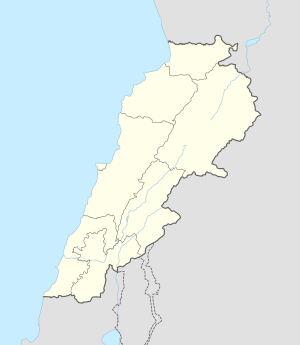Arsal
Aarsal, Ersal 'Irsal | |
|---|---|
Town and Municipality | |
| Coordinates: 34°10′46″N 36°25′15″E / 34.17944°N 36.42083°E | |
| Country | |
| Governorate | Baalbek-Hermel |
| District | Baalbek |
| Area | |
| • Total | 122.37 sq mi (316.94 km2) |
| Elevation | 5,090 ft (1,550 m) |
| Population Estimate | |
| • Total | 50,000[1] |
| Time zone | EST+7 |
| Alternative name | Ain Chaub |
|---|---|
| Location | 3 km (1.9 mi) east of Labweh |
| Type | Rock shelter |
| History | |
| Cultures | Natufian |
| Site notes | |
| Excavation dates | 1970, 1976 |
| Archaeologists | Bruce Schroeder |
| Public access | Yes |
Arsal (also spelled Aarsal, Ersal or 'Irsal; Arabic: عرسال), is a town and municipality situated east of Labweh, 124 kilometres (77 mi) northeast of Beirut, in Baalbek District of Baalbek-Hermel Governorate, Lebanon.[2] The population is predominantly Sunni Muslim.
It is a traditional town situated on the slopes of the Anti-Lebanon mountains.[3] It is known for its local hand-made carpet industry.[4] The area is known to be one of the few places in the Anti-Lebanon with a good water supply.[5] The Lebanese Ministry of Tourism brochure suggests that the name Arsal or Ersal means "God's Throne" in Aramaic. It documents several rock-cut benches (mastabas) in the village, numerous historical monuments in the nearby hills and an ancient fortified structure in the nearby Wadi Al-Toun of unknown date.[2]
- ^ "Hizbollah role blurs boundary of Syria conflict". Financial Times.
- ^ a b Ministry of Tourism Promenade Brochure - Baalbek Al-Hermel Archived July 16, 2012, at the Wayback Machine
- ^ American University of Beirut (1995). Research report. The University. Retrieved 23 September 2012.
- ^ Dominique Auzias; Jean-Paul Labourdette; Guillaume Boudisseau; Christelle Thomas (16 May 2008). Liban. Petit Futé. pp. 230–. ISBN 978-2-7469-1632-6. Retrieved 23 September 2012.
- ^ William Bayne Fisher (1966). The Middle East: A Physical, Social and Regional Geography. Methuen. Retrieved 23 September 2012.
